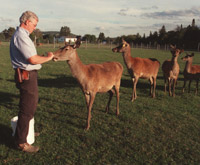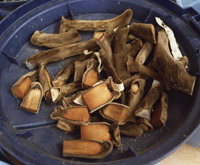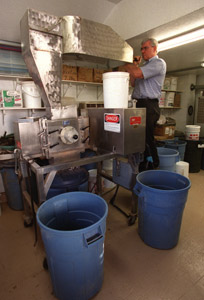Velvet Antler
Air Date: Week of March 7, 2003
An ancient Chinese remedy is being marketed in the United States as relief for arthritis sufferers. Velvet antler is a dietary supplement that comes from the ground antlers of deer and elk, although there’s been no independent research on the effectiveness of the substance. Charlotte Renner of Maine Public Radio visited a farmer in Mapleton, Maine who harvests deer antlers.
Transcript
ROSS: Many arthritis sufferers will try just about anything to relieve their chronic pain. In the past five years, a growing number have been popping capsules made from the ground up antlers of deer and elk. Powdered antlers have been a key ingredient in Chinese herbal medicine for thousands of years. There's been little western research into the effectiveness of the so-called velvet antler, but that hasn't dampened its North American sales, which one estimate puts at about five million dollars a year. Charlotte Renner paid a visit to a deer farm in the town of Mapleton, Maine. She has this report.
CHARLOTTE RENNER: A couple times a day, Darrell “Butch” Tobin takes a walk from his farmhouse office in Northern Maine to go outside and feed grain and apples to his 43 red deer. It's a pastoral scene, with rolling green grass, azure sky, and a split rail fence. And when the red deer sense mealtime, they get excited.
[SOUND OF DEER]
TOBIN: The first one is Hannah.
RENNER: Carrying a bucket in one hand, Tobin uses the other to unlock a chain link fence surrounding his shed. Ten years ago he couldn't have performed this chore because his arthritis was so bad that one arm was useless.
TOBIN: These are the chains that I mentioned that I couldn't hook with two hands.
RENNER: Back then, Tobin was raising red deer, a cousin of the elk, for meat. But then a breeder from New Zealand gave him a couple of deer antler capsules for his arthritis. Tobin said the pain disappeared after a couple of months, so he quizzed his friend from down under about the prospects of starting a new business. Producing a product called Velvet Antler.
TOBIN: I said, "Because there isn't anyone doing this in the United States, meaning the processing and the marketing, would it make sense if we do." And he said, with his New Zealand accent, "Your bloody right, mate." And that's how it started.
RENNER: Red deer drop their antlers in the summer, but by then, Tobin says, the horns have calcified and lost their medicinal value. So each spring, he tranquilizes the animals and saws off their antlers while they still contain the naturally occurring chemicals, glucosamine and chondroitin sulfate. He believes the natural elements are a step above the synthetic form found in some prescription drugs for arthritis.
 Darrell "Butch" Tobin feeds his red deer. (Photo: © Herb Swanson) Darrell "Butch" Tobin feeds his red deer. (Photo: © Herb Swanson) |
 Sawed off red deer antlers will be dried, frozen, ground up, and placed in capsules. (Photo: © Herb Swanson) Sawed off red deer antlers will be dried, frozen, ground up, and placed in capsules. (Photo: © Herb Swanson)
TOBIN: The reason they are much more effective than the man-made ones is because they are still in their natural form or their natural state. They haven't been disturbed. RENNER: And Tobin insists the deer don't seem all that disturbed about losing their crowing glory, which grows back every year. The harvested antlers get dried and frozen, and then ground up to be scooped into tiny capsules.  Butch Tobin and his grinder. (Photo: © Herb Swanson)
RENNER: According to the North American Elk Breeders Association, about 40 other farmers produce powdered antler products in the U.S. and Canada. Tobin says the active ingredients in the powdered antlers can support healthy joint structure and function. But he's careful not to make any claims about his product on the label or his website. The federal Food and Drug Administration has threatened to shut down his operation if he does any advertising about the alleged benefits of Velvet Antler. The FDA declined a comment for this story, except to confirm that Tobin's case is still open. So far, most research into the health benefits of the capsules has been paid for by the Antler Industry. But now, at Canada's University of Alberta, Professor Marian Allen is conducting a clinical study on the therapeutic value of glucosamine and chondroitin sulfate found in elk antlers, which are similar in chemistry to deer antlers. ALLEN: And both of those ingredients are important for maintaining the health of joints, and also there is some thought that they had the glucosamine, in particular might have an anti-inflammatory effect. The other couple of ingredients that have been isolated in the antler are the Omega-3 and Omega-6 fatty acids. The Omega-3 has been tested in people with arthritis, and has been found to have some anti-inflammatory effect also. RENNER: In Allen's study, 110 arthritis sufferers will get Velvet Antler, another 110 will receive a placebo. In a previous preliminary study, Allen did find that 30 rheumatoid arthritis sufferers who received deer antler capsules, experienced reduced joint inflammation with no harmful side effects. However, that research did not compare those results to a placebo. Allen's current study has the approval of Health Canada, which is similar to the National Institutes of Health in the United States. Meanwhile, sales of antler products are rising on shopping channels and in health food stores. [SOUNDS OF SHOPPERS] In Lois' Natural Supermarket in Southern Maine, a half dozen bottles of Tobin's Velvet Antler sit on a shelf beside a similar product from a competitor. The store owner's son, Lou Porta, says Tobin's bottles won't collect dust, despite a high price tag. PORTA: Most arthritis formulas are very expensive anyway, but this is even-- it's like double. It's extremely expensive. I mean, a bottle that contains 90 capsules, costs $50.99. And not everyone tries it or can try it, but the people who suffer from arthritis enough and can't find any relief, some of them will try this and then they consistently buy it. I mean, that's the reason we stock it, you know. RENNER: Porta says his customers don't care whether the remedy has the government's blessing or not. Meanwhile, the results of the Canadian study on the effectiveness of Velvet Antler are expected to be released sometime next year. For Living On Earth, I'm Charlotte Renner, in Maine. [MUSIC: Kevin Volans “White Man Sleeps” Pieces of Africa Elektra (1992)] Links
|





